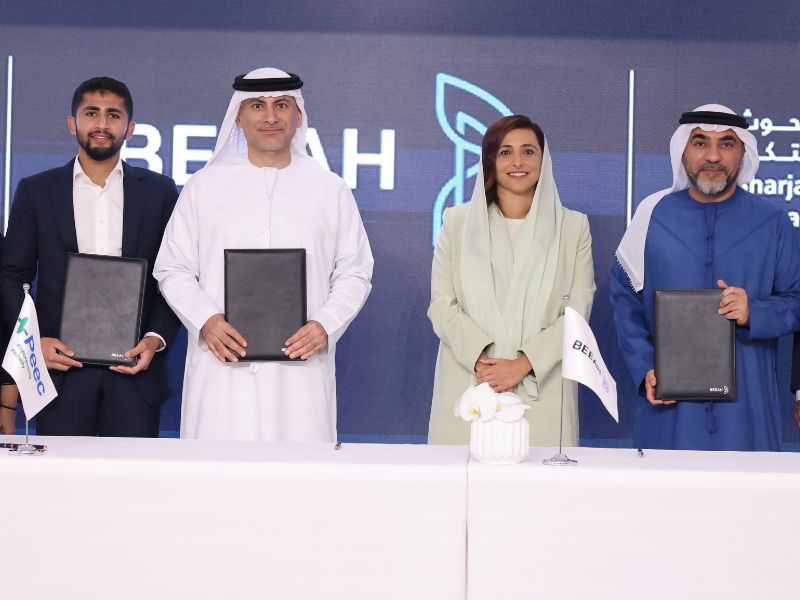In line with the UAE Net Zero by 2050 Strategic Initiative, BEEAH Group, Peec Mobility and the Sharjah Research, Technology and Innovation Park (SRTIP) have launched a ground-breaking partnership to advance the electrification of significant vehicle fleets in Sharjah, supporting national and global goals for zero-waste, circularity, sustainable transport, and decarbonisation. In the presence of Her Excellency Sheikha Bodour bint Sultan Al Qasimi, President of the American University of Sharjah and Chairperson of SRTIP, the partnership agreement was signed by Khaled Al Huraimel, Group CEO of BEEAH; Zach Faizal, Founder of Peec Mobility; and HE Hussain Al Mahmoudi, CEO of SRTIP, at the BEEAH Headquarters in Sharjah.
As part of the venture, vehicles will be repurposed using ReMethod, Peec’s customised engineering process, supporting the transition to electric vehicles while minimising the environmental impact of the vehicle manufacturing process. BEEAH’s collaboration with Peec aligns with its mandate to champion smart and sustainable solutions to increase the quality of life and build future-ready cities. Meanwhile, SRTIP bridges academic institutions, businesses, and government agencies to play a pivotal role in promoting innovation and entrepreneurship.
Supported by the Sharjah Roads & Transport Authority (SRTA), the University of Sharjah (UOS) and the American University of Sharjah (AUS), the strategic endeavour is a significant step towards localised production of repurposed vehicles. It will also engage academia in Sharjah to drive skill development, knowledge-sharing and employment opportunities.
The ‘ReTruck’ pilot project marks the first stage of the collaboration, where a BEEAH waste collection truck will undergo repurposing using the Peec method. All waste generated during this pilot will be recycled at BEEAH’s integrated waste management complex that houses a range of state-of-the-art recycling facilities and the UAE’s first waste-to-energy plant, which has collectively helped Sharjah achieve 90% landfill waste diversion, the highest in the Middle East. Peec Mobility and BEEAH will also collaborate to recycle and repurpose materials and spare parts, focusing on end-of-life batteries from electric vehicles. This joint effort aims to contribute to creating a circular economy, supporting net zero emissions goals in the UAE and beyond. Peec will provide specific volumes of scrap components, including vehicle engines, gearboxes, exhaust pipes, cooling systems and tires, for responsible disposal and recycling at BEEAH Recycling’s facilities.
Commenting on the initiative, Khaled Al Huraimel, Group CEO of BEEAH GROUP, said, “The UAE has actively fostered the adoption of electric vehicles and aims to increase the share of electric vehicles to 50 per cent of total vehicles on the country’s roads by 2050. At BEEAH, we are committed to supporting Sharjah and the UAE in transitioning to green mobility, starting with our fleet. With Peec’s custom repurposing technology, we are crossing a new and exciting frontier in sustainable transport, promising possibilities for transforming the entire mobility ecosystem in Sharjah, the UAE and beyond. We are pleased to partner with entities from Sharjah to nurture our home emirate’s sustainability ambitions and carbon reduction goals while creating an ecosystem of innovation, knowledge, collaboration, and economic growth.”
Following the successful deployment of the repurposed truck, the partnership will move on to the next step, including electrification of BEEAH’s fleet of over 2000 waste collection vehicles. Following BEEAH’s vision for zero-waste and decarbonisation, the Group’s fleet will be reengineered to perform as brand-new electric vehicles without the manufacturing and scrapping issues of the transport sector, in addition to ensuring the total diversion of all waste away from landfills.
With the completion of BEEAH’s fleet electrification, the third and final stage of the partnership will begin under the ‘ReSharjah’ phase. During this phase, the partners aim to repurpose vehicles across various mobility fleets, including cars, buses, and waste collection trucks; recycle essential automotive components; and launch R&D projects focused on sustainable and autonomous vehicles. As part of the ‘ReSharjah’ initiative, ‘ReFactory’, a dedicated facility, will be set up within BEEAH’s Waste Management Complex, powered by the Sharjah Waste to Energy Facility, and BEEAH’s upcoming landfill to solar project. The ReFactory will repurpose large vehicles from multiple fleets from key entities across the emirate. This strategic move will propel carbon reduction, leveraging the Peec method to redefine sustainable transport and waste management practices in a critical step towards a net zero future.
Zach Faizal, Founder of Peec Mobility, said: “We are honoured to enter into this momentous partnership with BEEAH Group and the Sharjah Research, Technology and Innovation Park in pursuit of our joint commitment towards sustainable mobility for Sharjah. Current efforts to achieve net zero targets demand the early scrappage of ICE fleets and a surge in EV production, contributing to higher manufacturing emissions. Peec Mobility presents a sustainable solution that involves repurposing retired petrol vehicles, preserving their body and chassis, and reintroducing them to the road as EVs. This mitigates environmental impact and ensures the circularity of existing fleets.”
“We look forward to bringing our method to Sharjah, stimulating R&D and inspiring skill development to drive positive change for a greener future.”
A UAE-grown start-up, Peec Mobility is driving the petrol-to-electric transition of vehicles. More performative than retrofitting, the Peec repurposing method turns traditional petrol-running vehicles into EVs at 30% lower cost and 80% less time than manufacturing new EVs. Peec has piloted its repurposing process in the UAE, starting with the iconic fleet of Toyota Camry taxis. This scalable process is now being extended globally as Peec collaborates with governments, regional administrations and companies to establish micro-factories, accelerating the achievement of net zero mobility.




